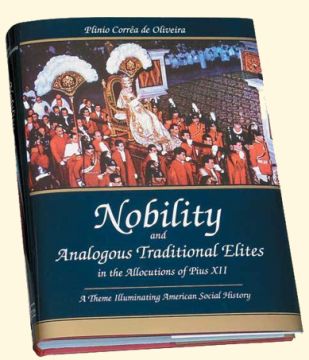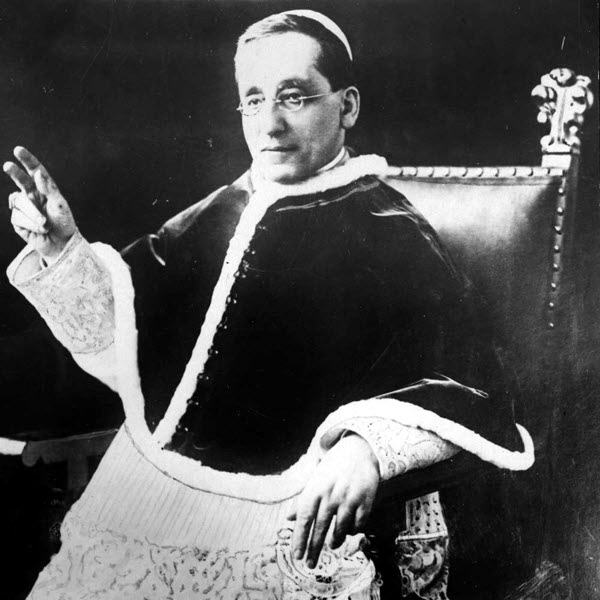|
Plinio Corrêa de Oliveira
Chapter VII
8. The Nobility of Our Time The Magnitude of Its Present Mission
|
|
|
Pope Benedict XV, at the end of the First World War, warmly eulogized the Roman Patriciate and Nobility’s dedication and heroism in the dramatic days of war, mentioning “another priesthood much like the Priesthood of the Church: that of the nobility.” a. The essence of all nobilities, whatever their nationality What is the substratum of the human type that characterizes the nobility? To answer this question, historical scholarship has accumulated data on the origin of this class, its political, social, and economic roles throughout the ages, its influence on morality, fashions, and social customs, and its patronizing of the arts and culture. What is a noble? A noble is a member of the nobility. This membership implies that he corresponds to a certain psychological and moral type which, in turn, wholly shapes him. However profound the transformations endured by this class throughout the ages, however numerous the varieties it presents according to different nationalities, the nobility is always one. For this reason, however much a Hungarian magnate might differ from a Spanish grandee, or a French duke and peer from a British, Italian, German, or Portuguese duke, a noble is always a noble in the public’s eyes. More specifically, a count is always a count, a baron always a baron, a hidalgo or gentleman always a hidalgo or gentleman. The historical vicissitudes the nobility endured modified its situation dramatically. While some nobles still remain at the summit of wealth and prestige, others are in the abyss of poverty, forced to do hard and humble labor to earn a living, and looked upon with sarcasm and contempt by many contemporaries imbued with the egalitarian and bourgeois spirit spread by the French Revolution. Still others are bereft of any goods, downtrodden and reduced to a proletarian condition by communist regimes from whose despotic domination they were unable to escape in time. b. Nobility: a standard of excellence — the impulse to all forms of elevation and perfection Deprived of any political power in contemporary republics, the nobility retains mere shreds of it in monarchies. It has a scant representation in the world of finance, when it has any. In diplomacy, as well as in the world of culture and the patronage of the arts, its role is much less evident than that of the bourgeoisie. In most cases, the nobility today is little more than a residue. Notwithstanding all this, it is a precious remnant that represents a tradition essentially consisting of a human type. How can this human type be defined? The very course of events made nobility a standard of excellence that would edify all men and, in a certain sense, give all excellent things the prominence they deserve.146 When we say that something is noble and aristocratic, we stress that it is excellent in its kind. This is so even in our society intoxicated with egalitarianism, vulgarity, and base moral corruption. Even down to the first decades of our century, temporal society, at least in its general lines, still tended to continuously improve in the most varied fields. As far as public or private religiousness and morality are concerned, this statement would need to be strongly nuanced. Today, on the contrary, there is an omnifarious tendency toward vulgarity and extravagance, and at times even toward the brutal and insolent triumph of ugliness and obscenity. In this sense, the revolution of the Sorbonne in 1968 was an explosion of universal scope that ignited evil tendencies long incubated in the contemporary world. These phenomena brought with them a pronounced proletarianization, in the most pejorative sense of the word. Nevertheless, the old impulse toward elevation and perfection, born in the Middle Ages and developed, in certain aspects, in the following centuries, has not died. On the contrary, it still checks, to some extent, the expansion of the proletarianizing impulse. In some ambiences, it even has a certain dominance. In the past, the nobility as a social class had the mission of cultivating, nourishing, and spreading this impulse toward perfection throughout society. It was preeminently oriented toward this mission in the temporal sphere, as was the clergy in the spiritual order. The noble was a symbol of this impulse, its very personification. He was like a living book in which all of society could read everything our elders, eager for elevation, yearned for and were gradually attaining. Such was the noble. Of everything he was, this precious impulse is perhaps the best he retains. Little wonder that men of our time, in growing numbers, turn to him and ask with mute anxiety if the nobility will preserve this impulse and even expand it courageously, and thus help save the world from the chaos and catastrophes into which it is sinking. Should the twentieth-century noble remain aware of this mission and, animated by Faith and love for a well-understood tradition, do everything to fulfill it, he will achieve a victory of no less grandeur than that of his ancestors when they held back the barbarians, drove Islam beyond the Mediterranean, or smashed through the gates of Jerusalem under the command of Godfrey of Bouillon. c. Pius XII’s main emphasis Of everything the nobility was or possessed in former times, the only thing left is this multifaceted excellence, along with a residual ensemble of indispensable conditions that prevent it, most of the time, from falling to a proletarian or proletarianizing situation. We said “only.” Indeed, how little this is in relation to what the nobles once were and had! But how much better this is when compared with the insolent and boastful vulgarity of so many of our contemporaries! How favorably this remnant of excellence among the true aristocrats compares with the vulgar corruption among the moneyed jet set, the extravagance of more than one surviving tycoon, the unrestrained self-indulgence and Sancho Panza-like security of certain middle and lower bourgeois! This excellence is the main emphasis of Pius XII’s allocutions to the Roman Patriciate and Nobility. The Pontiff shows the illustrious members of this class, and through them the whole world, that the excellence inherent to nobility confers on them an unequivocal place among the leading classes emerging from the new conditions of life; a place of clear religious, moral, and cultural significance, which makes the nobility a precious shield against the torrential decadence of the contemporary world. d. The nobility: leaven and not mere dust from the past — the priestly mission of the nobility to elevate, purify, and pacify the world On January 5, 1920, shortly after the First World War, Benedict XV (1914-1922) addressed the Roman Patriciate and Nobility. He uttered words of ardent praise for their dedicated and heroic conduct during the dramatic days of the conflict, while emphasizing the importance of the mission that lay before them in the ensuing period of peace. On that occasion the Pontiff spoke of a “priesthood much like the Priesthood of the Church: that of the nobility.” The Pontiff was not only alluding to the good example set by the Roman patricians and nobles during the war. With loftier considerations, he affirms that at the core of the nobility’s mission there is something priestly. Coming from a Pope, this eulogy of the nobility could not be greater. Of course, the Pontiff does not intend to equate the condition of a noble with that of a priest. He does not affirm an identity between the two missions, only a strong similarity. He develops this principle with quotations from Saint Paul, as we shall see. When stressing the importance and authenticity of the noble’s duties in the field of Faith and morality, the Pontiff’s teaching takes on a superb force of expression. “Alongside the “regale Sacerdotium” of Christ, you too, My Children, rose up as society’s “genus electum,” and your task was that which above all others resembled and emulated the task of the clergy. While the clergy aided, supported, and comforted with words, example, courage, and the promise of Christ, the nobility also performed their duty on the field of battle, in the ambulances, in the cities, in the countrysides; and, in fighting, assisting, striving, and dying, they remained true—old and young, men and women—true to the traditions of their ancestral glories and to the obligations that nobility entails. “If, therefore, it pleases Us to hear praise given to the priests of our Church for the work done during the painful period of the war, it is also right that We should give due praise in turn to the priesthood of the nobility. Both of these priesthoods serve as the Pope’s attendants, for in the darkest hours they have well interpreted his sentiments”.147 Benedict XV then speaks about the duties of the nobility in the period of peace that was beginning. “Should We not, therefore, say that the priesthood of the nobility, like the priesthood that will continue its good works even in peacetime, will be viewed by Us with especial benevolence? Indeed, from the zealous ardor displayed in times of misfortune We are pleased to infer the constancy of purpose with which the patricians and nobles of Rome will continue to carry out, in happier days, the holy tasks on which the priesthood of the nobility lives. “St. Paul the Apostle admonished the nobles of his day, that they might be, or become, what their station required of them. [He was] not satisfied with having said that they too should present themselves as models of good action, in doctrine, in integrity, in seriousness of purpose: “in omnibus te ipsum praebe exemplum bonorum operum; in doctrina, in integritate, in gravitate” (Titus 2:7). Saint Paul was thinking more directly of nobles when he wrote to his disciple Timothy to admonish the wealthy “divitibus huius saeculi praecipe,” that they might do good and become rich with good works: “bene agere, divites fieri in bonis operibus” (I Tim. 6:17-18). “One can rightly say that the Apostle’s admonitions are admirably applicable as well to the nobles of our times. You too, O beloved Children, the higher your station, the greater your obligation to lead others by the light of your good example: “in omnibus te ipsum praebe exemplum bonorum operum.”148 Some readers might object: Do these duties also apply to the nobility in our days, so different from those of Benedict XV? Would it not be more objective to say that these duties now belong as much to any citizen as to the nobles? The teachings of Benedict XV run counter to these objections. The Pontiff continues: "In all ages nobles have been duty-bound to assist in the teaching of the truth, “in doctrina“; today, however, when the confusion of ideas, companion to the revolution of the people, has in so many places and in so many minds made the true notions of right, justice, charity, religion, and fatherland disappear, it has become all the more imperative for the nobility to strive to restore to the intellectual patrimony those sacred notions that should guide them in their daily activities. In all ages nobles have been duty-bound to allow nothing indecent to enter their words and their actions, that their own license might not become an incitement to the vices of their subalterns, “in integritate, in gravitate.” Yet, this duty too, Oh how urgent and weighty it has become, because of the bad habits of our time! Not just the gentlemen are beholden, however; the ladies, too, are obliged to join together in the holy struggle against the extravagancies and obscenities of fashion, distancing themselves from, and not tolerating in others, what is not permitted by the laws of Christian modesty. "And coming to the application of what Saint Paul advised directly to the nobles of his day,…to Us it is enough that the patricians and nobles of Rome continue, in peacetime, to shape themselves by that spirit of charity of which they have given such wonderful proof in times of war…. "Your nobility, then, will not be seen as a useless relic of times gone by, but as a leavening to resurrect corrupt society; it will be a beacon, a preserving salt, a guide for wanderers; it will be immortal not only on this earth where everything, even the glory of the most illustrious dynasties, fades and vanishes, but will be immortal in heaven, where everything lives and is exalted in the Author of all things beautiful and noble".149 When giving the Apostolic blessing at the end of the allocution, the Pontiff manifests his desire that “each might cooperate with the priesthood proper to his class toward the elevation and purification of the world and, by doing good to others, ensure entry for himself as well into the kingdom of eternal life—’ut aprehendant veram vitam!'”150 e. Present admirers of the nobility Even when scorned and despised, the noble who remains worthy of his forebears is always a noble. He is the object of special attention, and not rarely even courtesy, on the part of those with whom he comes into contact. An example of the interest aroused by the nobility is the fact that today, even more than in preceding decades, there is in every society a growing number of people who admire the nobility with great respect and a moving, almost romantic, interest. A list of facts proving the presence in our days of this compact vein of admirers would be endless. Two facts speak for themselves. One, already mentioned, is the joyous and admiring enthusiasm with which countless multitudes throughout the world accompanied, via television, the marriage ceremony of the Prince of Wales and Princess Diana. Another is the constant growth of the Parisian magazine Point de Vue—Images du monde, which is dedicated to news concerning the aristocratic segments of the population around the world, be they in monarchies or republics. The circulation of Point de Vue, around 180,000 copies in 1956, grew to 515,000 in 1991.151 f. The nobility: thesis and antithesis At this point we should include some considerations on those moneyed elites that, instead of striving to cultivate qualities appropriate to their high economic station, pride themselves on maintaining their vulgar habits and lifestyles. Individual property tends to remain within the lineage of its owner. The family institution leads to this in a powerful way. This has resulted, at times, in the formation of commercial, industrial, and publishing lineages, or even “dynasties.” Each of these family groups can exert over political events an incomparably greater power than the common voter, although all citizens are equal in the eyes of the law… Do these lineages constitute a new nobility? From a strictly functional point of view, perhaps they do, but this is not the only point of view, nor even necessarily the main one. Concretely, this new “nobility” frequently is not, nor could it be, a true nobility, foremostly because a great part of its members do not wish to be noble. In fact, egalitarian prejudices, which so many of these lineages have cultivated and flaunted since their origin, lead them to differentiate themselves progressively from the old nobility, become insensible to its prestige, and, not infrequently, downgrade it in the eyes of the world. This is done not by a forced elimination of the characteristics differentiating the old nobility from the masses, but by this new “nobility’s” ostentation of a characteristic willingly cultivated for demagogic purposes. This characteristic is vulgarity. While the historical nobility was and wanted to be an elite, this modern antithesis of the nobility frequently prides itself in not differing from the masses. It strives to camouflage itself with the ways and habits of the masses, purportedly to escape an impending vengeance of the demagogic egalitarian spirit. This spirit is usually fanned by the mass media whose owners and top executives paradoxically often belong to this same antithetical nobility. As the head with the body, the nobility naturally forms an organic whole with the people. Conversely, this antithetical nobility tends to avoid this vital differentiation as much as possible, striving—at least in appearance—to integrate itself into that great amorphous and lifeless whole which is the masses.152 It would be exaggerated to affirm that all contemporary plutocrats are this way. But many of them undeniably are. This is especially true of some of the richest among them, to whom, by the way, an attentive observer will not deny notability by their dynamism, their power, and the archetype of their characteristics. Footnotes: (145) The teachings of popes, saints, doctors, and theologians about the conditions for a just war can be found in Nobility and Analogous Traditional Elites, Documents XI. (146) Regarding the nobility as a social factor in the propulsion of society toward all forms of elevation and perfection, see also Nobility and Analogous Traditional Elites, Appendix V. (147) L’Osservatore Romano, January 5-6, 1920. (148) Ibid. (149) Ibid. (150) Ibid. For the full text of this allocution, see Nobility and Analogous Traditional Elites, Documents II. (151) We read in Dictionnaire encyclopedique QUID in the section “Les journaux se racontent” (Robert Laffont, 1991, p. 1218): “The history of Point de Vue is that of a magazine which, without financial aid or advertising, managed year after year to rank among the top illustrated French periodicals of international class.” This happened, we add, despite its being controversial in more than one circle of the French elite. |
|


